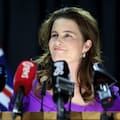We Kiwis love our barista-made coffee – it’s one of the things we miss most when we go into lockdown.
And it’s probably true that the less we pay, the happier we are. But should we all be paying the same, no matter where we buy?
Coffee brewer Jessica MacDonald from Eighthirty Coffee Roasters says there are solid reasons for the varying prices around the country.
“It comes down to the quality of the ingredients, and how much coffee they are buying - so - the quantity of coffee,” Jessica says.
Jessica says think of coffee like wine.

“A glass of wine is a different price, you can get a $10 glass of wine, you can get a $20 glass of wine, but they're not going to be the same thing."
But of course, unlike wine, most coffee beans aren't grown here, most come from Africa and South America - Brazil being the top coffee bean producer in the world.
To get the beans from there to Aotearoa costs.
“We have to pay per kilo of coffee and then we have to bring it into the roastery, and it has to be stored, it has to be roasted, packed and then it gets to the cafe, and then gets brewed in a cafe, so there's a lot of steps before it actually gets to your cup," Jessica says.
“You got the beans, you've got the milk, barista's hours, packaging, power, rent, especially for ones that don't do food as well, they're relying on the profit in that cup of coffee,” she says.
And Jessica says although our appetite for coffee is heating up – last year we imported 16 million dollars’ worth of Brazilian beans, four million more than 2019 – the prices we pay haven’t gone up much in the last five years.
Compared to the rest of the world, on average, we're far from the most expensive.
According to the World Coffee Index 2021, in South Korea you could pay as much as $11 for a regular cup, in the US, you would pay $5.40 for your cup of Joe, a café au lait in Paris would come in at just $4.80, and for the cheapest coffee try Kathmandu, Nepal – where a brew costs just over $2.
In Aotearoa the average price is about $4.70, then, specialist milk can add up to $1, and the decaf process is also costly and usually done offshore - in Mexico, Switzerland or Canada.
Our own pre-Covid price check found coffee as cheap as $2.50, an average of around $5, and the most expensive we could find was $6.50.
You’ve told us that in rural Aotearoa you spend up to $7.50, which Jessica puts down to small population meaning less coffee sold.
“They may only be selling like four kilos of coffee a week, so they don't have as much profit in that, where somewhere that's in a big city might be selling twice that.”
“They have to pay for freight, and they have to look after their own machine because they're not close to their coffee roaster.”
Jessica predicts that world events could cause coffee beans to rise in price by 30 per cent by the end of 2021.
“Brazil had a bad drought, followed by a frost, which has wiped out like 30 per cent of the coffee it produces, so next year they'll be a five million bag shortage of Brazilian coffees,” Jessica says.
“Then there's Covid, there's various political issues. Columbia had huge political problems, so coffee wasn't able to get out of Columbia. There's just a supply and demand shortage”.
Times are tough, so when we get through our current crisis, let’s get out there and support our local baristas.


















SHARE ME